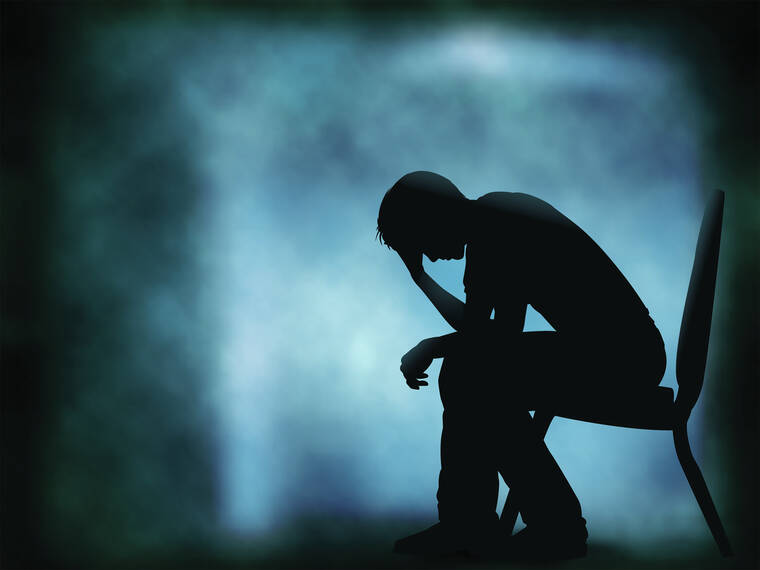A recent survey from CNN and the Kaiser Family Foundation found 90% of people in the U.S. think the country is experiencing a mental health crisis.
The U.S. Centers for Disease Control and Prevention backed up the report, adding those seeking help increased from 1 in 5 to 2 in 5 people during the COVID-19 pandemic.
But some health care providers in Hawaii think the reason for the increase isn’t just the pandemic, citing a variety of symptoms such as stress, political conflict, work staffing shortages, insurance issues and because there’s less of a stigma for those who seek mental health services.
“This could be solely due to pandemic-related issues, but I’d imagine it’s a lot more complicated than that,” said Kevin Faust, a mental health therapist who runs Akahai Emotional Wellness in Hilo.
Faust believes the uptick in public awareness about mental health problems began during the 2016 election, when reports of violence gained more attention in the news.
“It was not just the increase in violence, but an increase in racism, sexism, denial of rights to certain groups of people, war in Europe, inflation, corporate greed, global climate change, immigration, low wages, and many other issues,” he said. “Our mental health issues are a symptom of a broken system.”
Over the last two years, Faust has noticed an increase in narcissistic personality disorder, NPD, and antisocial personality disorder, ASPD, among his patients.
“In layman’s terms, people with NPD are sociopaths, and those with ASPD are psychopaths,” he said. “The combination of the two disorders are potentially deadly, such as serial killers and mass murders, but also the kind of people who would abuse or even kill their romantic partner.”
He added that victims of NPD- and ASPD-related abuse often suffer from post-traumatic stress disorder, or complex PTSD, which also increases the number of people seeking mental health services.
Financial challenges from both job loss and the rising cost of living also contributed to people seeking help with their mental health.
A 2022 Access to Care survey from Community First Hawaii found those who had to cut back on food during the pandemic were 66% more likely to report declining mental health.
Among the 3,000 Hawaii residents and health care providers polled for the survey, 38% reported a deterioration of mental health over the past two years, while 3 in 10 said they live in a household where someone needs additional mental health assistance.
“Early during the shutdown, people were on high alert, a lot of people were panicking, and a lot of people’s mental illnesses were triggered,” said Kumi Macdonald, executive director of the National Alliance on Mental Illness Hawaii, or NAMI. “People were calling us saying, ‘I can’t get a therapist, there’s a three- or six-month long wait list, and I’m in crisis. What do I do?’
To meet demand, NAMI offered support, education and awareness groups for those in recovery and their families. But as pandemic restrictions loosened up, people started abandoning their groups.
“We get a lot of calls and a lot of people asking for help. But then something was weird. They needed the help, but they stopped attending our classes,” said Macdonald, “Anecdotally, this has been across the state. People are dropping out of programs, and we’ve had to cancel or postpone classes.”
Macdonald believes people are leaving treatment in favor or returning to their personal lives, without completing the necessary steps to improve their mental health.
“People are in crisis, but they want to be out,” she said. “They want to get back to their regular lives.”
Macdonald added NAMI is having issues filling spots for leaders, teachers and staff, so the organization has started offering training sessions to increase its number of support group leaders.
“We were one of the first in the nation to start an online support group for people with mental illness,” she said. “Once they get stabilized, some of these people come back and say, ‘Now I want to be trained to be a leader.’”
The Access to Care survey also found that 78% of all health care providers in Hawaii agree mental health counseling is the most needed medical specialty, followed by psychiatry at 73%.
“I think a lot of people are starting to realize the importance of mental health when it comes to physical health,” said Katherine Goodman, medical assistant and clinical psychology intern on Oahu. “A lot of people with chronic pain, hypertension, high blood pressure — they’re starting to see how their anxiety affects it.”
Goodman noted even though her patient caseloads have remained stable, staffing shortages have created barriers.
“It’s not that we’re seeing more people seeking services,” she said. “It’s that there’s less providers being hired.”
One recent solution was implementing the 988 Suicide &Crisis Lifeline, a nationwide call center launched in July. But one report from the federal government’s Substance Abuse and Mental Health Services Administration, or SAMHSA, showed that while the call center reported a 45% increase in contacts, the lifeline reported just an 84% answer rate due to staffing shortages.
While more patients reaching out and discussing mental health helps eliminate the stigma, providers are worried demand will outpace supply.
“I think it’s a positive that patients are more aware, but it’s also concerning that the answer might be therapy,” said Goodman. “How can they get it when there’s a shortage of providers?”
Email Grant Phillips at gphillips@hawaiitribune-herald.com.






